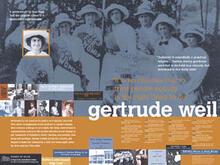Mary Belle Grossman
Mary Belle Grossman made history in 1918 as one of the first two women admitted to the American Bar Association and then dedicated her career to protecting women. She joined the Women’s Suffrage Party of Greater Cleveland as its treasurer, a member of its Labor Committee, and head of its Wage Earners League, learning to canvas neighborhoods door-to-door. She then used these skills when seeking a municipal judgeship in 1921 and became the city’s second female judge in 1923. Due to her hard line on protecting vulnerable women, in 1947 the Cleveland Press declared her a “militant feminist [who] has been bad news to wife beaters, gamblers, and persons charged with moral offenses." Even after her retirement in 1959, Grossman remained involved in activism.
Mary Belle Grossman was, in 1918, was one of the first two women admitted to membership in the American Bar Association. After the passage of the Nineteenth Amendment in 1920, she became one of Cleveland’s most successful political activists.
Early Life and Career
One of nine children of Louis and Fannie (Engle) Grossman, she was born in Cleveland on June 10, 1879, and attended local public schools and business college. She determined to become a lawyer while working as a stenographer in a cousin’s law firm: “I studied law in self-defense because all the young men were getting promotions faster than I.” In 1912, she graduated from the law school at Baldwin-Wallace College and was admitted to the Ohio bar.
Cleveland’s suffrage movement launched Grossman’s public career. The treasurer of the Woman Suffrage Party of Greater Cleveland, she also led its Wage Earners League and served on its Labor Committee. She later received the political endorsement of Cleveland labor organizations. From suffragists, Grossman learned about meticulous house-by-house, ward-by-ward canvassing, a strategy she successfully employed in her own campaigns. She also learned perseverance, for Ohio suffragists lost three campaigns to get a suffrage amendment to the state constitution.
In 1921, Grossman lost her own first bid for political office—a race for a municipal judgeship. “A woman to succeed in law must have courage and keep a stiff upper lip even in the midst of much that is at first disheartening,” she later remarked. In 1923, she became Cleveland’s first female municipal judge and Cleveland’s second female judge (the first was fellow suffragist Florence E. Allen, later on the Ohio Supreme Court and the U.S. Sixth Circuit Court). Grossman never lost another election, consistently winning endorsements from the major newspapers, organized labor, the Cleveland Bar Association, and women’s organizations such as the National Council of Jewish Women and the Women’s City Club. Although she was a charter member of the League of Women Voters of Cuyahoga County, the league has never endorsed candidates.
Legal Legacy
In 1926, Grossman was appointed to the new Morals Court, which handled cases involving prostitution, drunkenness, domestic violence, and sex crimes. Grossman often referred to her court as a “social agency” and used her position to protect women and families, publicly urging that abandonment be treated as a felony and that grounds for divorce be made tougher. In 1947, the Cleveland Press described her as a “militant feminist [who] has been bad news to wife beaters, gamblers, and persons charged with morals offenses.” Associates referred to her as “Hard Boiled Mary.” Grossman retired in 1959 after thirty-six uninterrupted years on the bench. She remained involved in a wide range of community activities, including African-American and Jewish women’s organizations.
On the fiftieth anniversary of the passage of the Nineteenth Amendment, which granted voting rights to voters irrespective of sex, Grossman, then ninety-one, remembered the victory with enthusiasm: “It was a great day for women. We all went right down to register.” Praising the women’s liberation movement, she urged women to enter politics and public life as she had.
Mary Belle Grossman died on January 27, 1977.
Abbott, Virginia Clark. The History of Woman Suffrage and the League of Women Voters in Cuyahoga County, 1911–1945 (n.d.)
Grossman, Mary B. Papers. Ms. collection 3660, Western Reserve Historical Society, Cleveland, Ohio.



